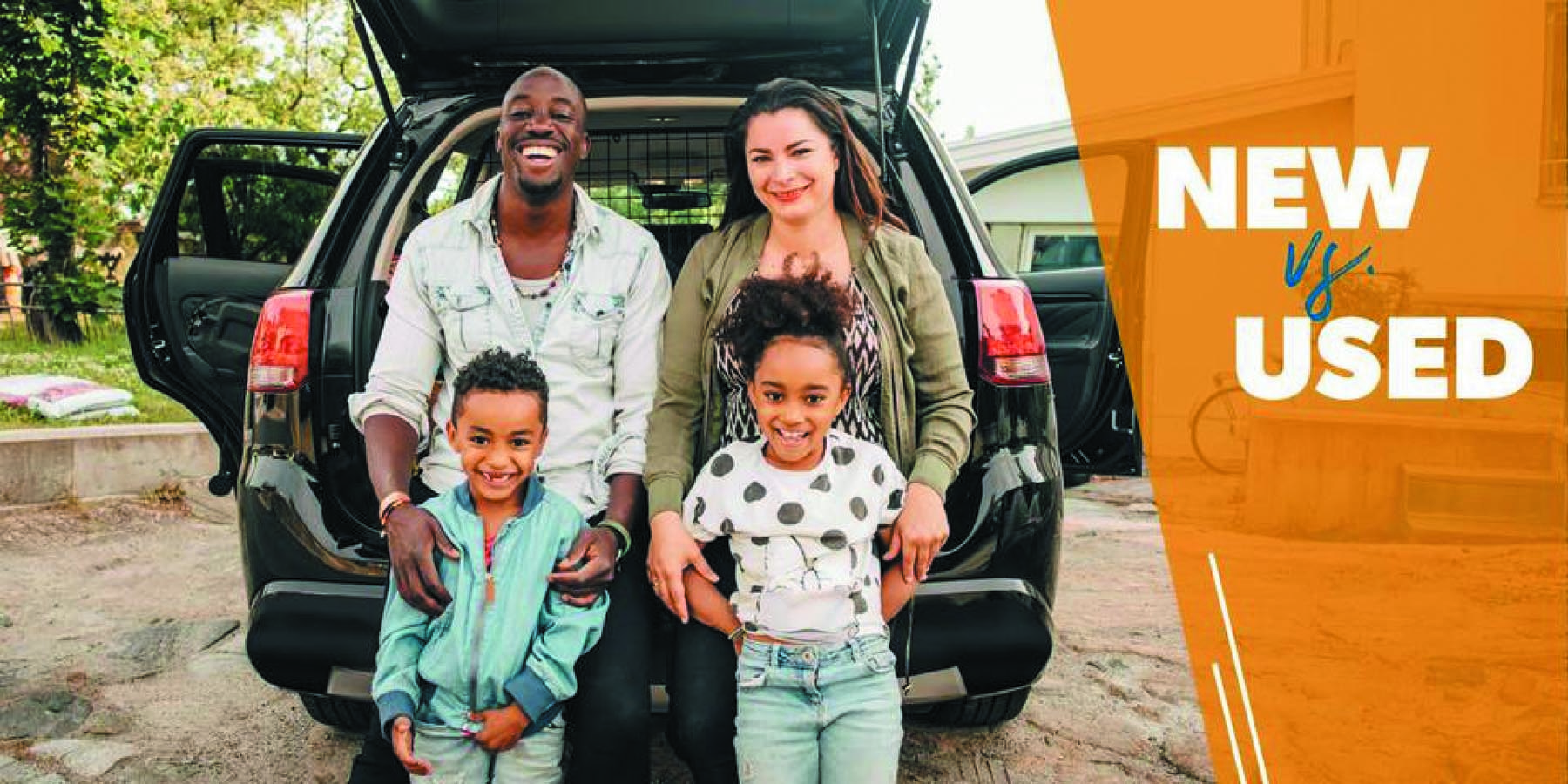If you’re shopping around for some new wheels, it’s easy to get swept off your feet by all the fancy bells and whistles inside the newest cars to hit the market.
After all, some of the latest models come with all these cool new features like heated steering wheels and massaging seats. That’s right, the seats give you a massage. What a time to be alive. It’s almost enough to make you forget about the 1–2-year-old used cars that are also sitting in the dealership lot. Because those are so last year.
But is new really better? What are the pros and cons?
New vs. Used Cars: Which Are Better?
We’re not going to beat around the bush: The very best way to buy a car is to save up and buy a reliable, slightly used car (with cash).You’re always going to be better off buying used and paying up front instead of going for the shiny new model that some overcaffeinated car salesman is trying to get you to borrow money for.
The choice between a new or used vehicle (and how you pay for it) could be the difference between riding the highway to wealth and financial independence or spinning your wheels in a rut of debt and endless payments.
But if that new car smell has given you a serious case of car fever, the only prescription is cold, hard numbers. So, let’s get right down to it!
Reliability
“Buy a new car,” they said. “You won’t have to worry about repairs or maintenance,” they said.
First, safety is always a concern. And one of the most common arguments against buying a used car is that it’ll wear out sooner and won’t be as reliable as the new ones rolling straight off the assembly line.
The truth is that despite all the claims from your friends and neighbors to the contrary, you can find like-new used cars that are just as safe and dependable as a new car—and at a much cheaper price.
You can find like-new used cars that are just as safe and dependable as a new car—and at a much cheaper price.
In fact, some newer cars (especially models in their first year of production) are among the least reliable cars you can drive.(1) From faulty air conditioners to troublesome transmissions, many drivers of newer model cars end up making constant trips to the mechanic or getting manufacture recall notices in the mail.(2)
So just keep in mind when you’re car shopping that new doesn’t automatically equal safe. It all depends on the type of car you’re looking at and how long the car has been on the road.
Depreciation
Now for the math. Whether you have a car, a boat or a lawnmower, they all go down in value over time as they go through the wear and tear of everyday use. That loss in value is called “depreciation,” and it’s a fact of life.
But here’s the kicker when it comes to car depreciation: New cars lose their value at a much faster rate than used cars do. Depending on the make and model, some cars might hold their value a little better than others. But they all lose their value over time—especially new ones.
Just how fast do new cars lose their value? Buckle up. It’s going to be a bumpy ride! Here’s a look at how quickly a new car loses its value:
- AFTER ONE MINUTE: If you buy a shiny new $35,000 car, it loses somewhere between 9–11% of its value the moment you drive off the lot. You’re basically throwing $3,500 out the car window as you drive the car home for the first time!
- AFTER ONE YEAR: Fast-forward 12 months and that car sitting in your driveway will have lost around 20% or maybe even more of its value from the day you bought it.
- AFTER FIVE YEARS: You can expect your new car to lose 60% of its value after driving it around for five years.(3) Most cars lose about 10% of their value every year after that steep first-year dip.(4)
| Initial Car Value | $35,000 |
| New Car Value After . . . | |
| 1 minute | $31,500 |
| 1 year | $28,000 |
| 2 years | $24,500 |
| 3 years | $21,000 |
| 4 years | $18,500 |
| 5 years | $15,000 |
If you buy a $35,000 shiny new car, that car loses somewhere between 9-11% of its value the moment you drive off the lot. Fast forward 12 months and that car will lose around 20% of its value from the day you bought it.
Think about it: If you just wait a few years, you could let someone else take on the brunt of those first few years of depreciation and buy a good-as-new car for half the price!
And don’t even think about financing it with car payments. Things with motors in them go down in value, and you should never borrow money for anything that goes down in value. No exceptions!
The True Cost of Buying New vs. Used
Let’s see how this plays out in real life. Let’s say Jack and Tony are both looking to buy new vehicles. Jack decides to save up and buy a reliable used car with cash while Tony goes the “normal” route and finances a new truck.
The average new car loan is $31,722 with a monthly payment of $545 over an average loan term of 69 months.(5) That’s almost six years of $545 car payments.
To put those numbers in perspective, let’s say Tony takes out an average car loan ($31,722) with an average monthly payment ($545) for the average loan term (69 months) and keeps the truck all the way through the end of the loan.
Like we talked about earlier, his new truck starts losing value the moment he drives it off the lot and continues to lose a huge chunkof its value in the first few years. After four years, it’s worth less than half of what Tony bought it for and continues to drop 10% each year after that.
That means that at the end of the six-year loan, Tony paid $37,605 in car payments for a truck that was originally worth less than $32,000 and is now worth about $10,000 (if he’s lucky) at the end of the loan term.
Meanwhile, Jack found a four-year-old sedan with low mileage and plenty of life left in the tank for $12,000, and he paid for it with cash. That means he owns the car free and clear. No payments!
So what could Jack do with an extra $545 each month that he’s not using to pay off the car?
In one scenario, he could put all those savings toward upgrading his car down the road. If he saves $545 every month, he could buy a $20,000 car in just three years, while Tony is still just halfway through the loan on his truck.
Better yet, what if Jack swears off car payments and invests that $545 in solid-growth stock mutual funds from age 30 to 70? Assuming an average annual rate of return, he could end up with more than $5 million saved for retirement.
And what would happen if he splits that average monthly car payment evenly between saving for his next car and retirement investing? Jack could keep buying slightly used cars for $12,000 every four years and still have $1.5 million saved for retirement by the time he hits age 65.
We hope Tony likes the truck!
Is It Ever Okay to Buy a New Car?
As a general rule of thumb, the total value of your vehicles (anything with a motor in it) should never be more than half of your annual household income. Dave doesn’t recommend buying a new car—ever—until your net worth is more than $1 million. If you’re a millionaire and you want to buy a new car that costs a very small percentage of your net worth, then go for it.
When we recently asked everyday millionaires what kind of cars they drive, we found that the average millionaire drives a four-year-old car with 41,000 miles on it. And eight out of 10 millionaire car buyers drive it away debt-free without a car payment.
The real problem with new cars is that the vast majority of the people who buy them (85%) either take out a loan or a lease to get one.(6) And today, thanks in large part to our love affair with new cars, more than 113 million Americans have taken out auto loans and owe $1.27 trillion (with a “t”) in car debt. Only mortgages and student loans account for more of America’s total debt balance.(7)
As a result, most folks who buy a new car wind up feeling like their car owns them instead of the other way around.
Buying Used Will Save You Money on Car Insurance
We’ll close with this one because a lot of car buyers forget to factor this into the equation and then suffer the sticker shock from the steep insurance premiums that come with a new car.
Drivers of new cars often get stuck with higher-than-average premiums. Because new cars are more costly to repair or replace, they also cost more to insure. Even with some of the latest safety technology, insurance companies rarely offer discounts to new-car drivers for having those features.
While new-car drivers will spend roughly $1,650 that year on car insurance premiums, you could save 12% on insurance premiums if you buy a five-year-old version of the same car.(8)
If you’re purchasing a vehicle and are ready to save money on car insurance, our Endorsed Local Provider (ELP) insurance agents can help you find the best deals on auto coverage in your area.
© Lampo Licensing, LLC. All rights reserved.


